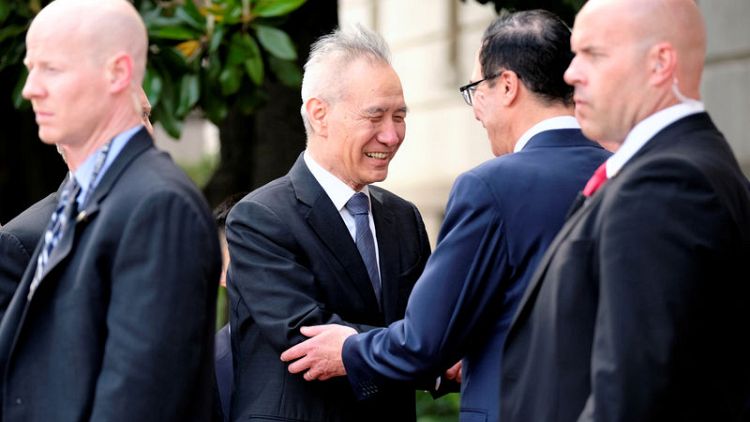By Jeff Mason and Yawen Chen
WASHINGTON/BEIJING (Reuters) - U.S. President Donald Trump said on Thursday he was taking steps to authorise new tariffs on $325 billion (£249.46 billion) in Chinese imports as officials prepared for last-ditch talks to avert an escalation of a trade war that threatens to derail the global economy.
With acrimony between Washington and Beijing rising, there seemed to be little time to salvage what had appeared to be the framework of a tentative deal between the two sides before another round of punitive tariffs are triggered.
The United States is set to increase its existing tariffs on $200 billion in Chinese goods to 25 percent from 10 percent at 12:01 a.m. EDT (0401 GMT) Friday. Trump said on Thursday he was "starting ... paperwork today" to impose a 25 percent tariff on the $325 billion in Chinese goods untouched by the trade war so far.
China is expected to retaliate, as it has with previous U.S. tariffs, effectively subjecting all trade between the world's two largest economies to punitive levies. Consumer products, including cell phones, computers, clothing and toys, would be especially hard hit.
Trump, who has adopted protectionist policies as part of his "America First" agenda aimed at rebalancing global trade and boosting U.S. manufacturing, accused Beijing of reneging on commitments made during months of negotiations.
"We were getting very close to a deal, then they started to renegotiate the deal. We can't have that. We can't have that," Trump said at an event at the White House.
Data released Thursday showed the U.S. goods trade deficit with China shrank to its smallest level in five years in March, which could further embolden Trump as he escalates his trade war with Beijing.
TENSE TALKS
Chinese Vice Premier Liu He was due to start two days of talks in Washington with U.S. Trade Representative Robert Lighthizer and Treasury Secretary Steven Mnuchin at 5 p.m. EDT on Thursday.
Earlier on Thursday in Beijing, China appealed to the United States to help salvage the deal. Commerce Ministry spokesman Gao Feng said the decision to send Liu to Washington despite the tariff hike threat demonstrated China's "utmost sincerity."
"We hope the U.S. can meet China halfway, take care of each others' concerns, and resolve existing problems through cooperation and consultations," he told a news briefing.
"The U.S. side has given many labels recently, 'backtracking', 'betraying' etc. ... China sets great store on trustworthiness and keeps its promises, and this has never changed." Gao said.
A source familiar with the talks described China's changes to the proposals as "tremendous," noting that it could take a month to fix changes to the text, unless the United States accepts them wholesale.
Another person close to the discussions said possible outcomes of this week's meetings include an "orderly breakup" of trade negotiations between the two countries. However, another possibility is a retreat by China on its demands for major changes, with the aim of cementing a deal before the Group of 20 summit in Japan in late June.
U.S. stock indexes fell on Thursday ahead of the trade talks, but they pared losses significantly after Trump said he had received a "beautiful" letter from Chinese President Xi Jinping. U.S. oil prices also slid, though Brent oil futures settled higher after Trump cited the letter from Xi. U.S. Treasury yields fell as investors sought safe-haven assets.
DEEP RIFT
Reuters on Wednesday revealed the extent of the deep rift between China and the United States, reporting that a draft trade agreement text sent by Beijing on Friday night was riddled with reversals that undermined core U.S. demands.
In seven chapters of the draft, China had deleted its commitments to change laws to resolve complaints that caused the United States to launch a trade war: theft of U.S. intellectual property and trade secrets; forced technology transfers; competition policy; access to financial services; and currency manipulation, sources told Reuters.
The stripping of binding legal language from the draft struck directly at Lighthizer's highest priority. The U.S. trade representative views changes to China's laws as essential to verifying compliance after years of what U.S. officials have called empty reform promises.
Trump told supporters at a rally in Florida on Wednesday that China "broke the deal," and vowed not to back down on imposing new tariffs on Chinese imports unless Beijing "stops cheating our workers."
A protracted trade war between the United States and China would damage the world economy, disrupt supply chains and rattle investors already nervous over a global slowdown.
Since July last year, China has cumulatively imposed counter-tariffs of up to 25 percent on about $110 billion of U.S. products. It last levied tariffs, of 5 percent to 10 percent, on $60 billion of U.S. goods including liquefied natural gas and small aircraft in September.
Based on 2018 U.S. Census Bureau trade data, China would only have about $10 billion in U.S. imports left to levy in retaliation for any future U.S. tariffs, including crude oil and large aircraft.
Gao did not answer directly when asked if China would consider imposing tariffs on imported U.S. services.
While the United States wants to reduce the scale of its trade deficit with China, it is also seeking stronger protection for American intellectual property and more market access in China for U.S. companies.
(Reporting by Jeff Mason in Washington and Yawen Chen in Beijing; Additional reporting by David Lawder and Doina Chiacu in Washington, and Se Young in Beijing; Writing by David Lawder; Editing by Paul Simao and Leslie Adler)



